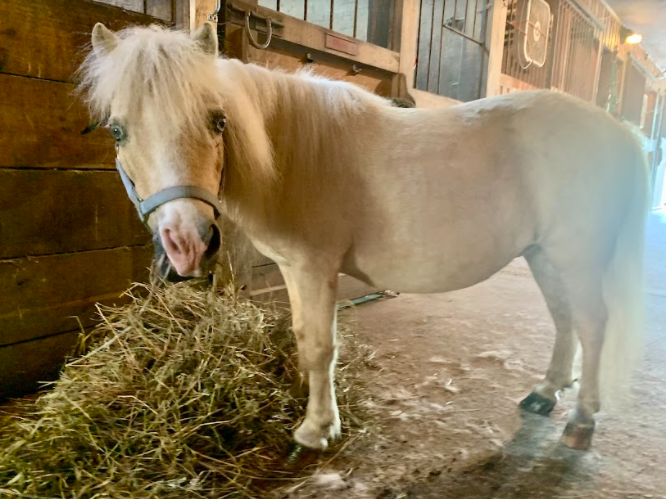Covid Causes Chaos in the Rescue World
How Animal Sanctuaries Survived Covid-19
Vanna the Miniature Horse: a free rent resident at Locket’s Meadow Farm.
October 29, 2021
Local animal shelters were struck hard by the spread of Covid-19. The foundations that rely so heavily on volunteers are now struggling to stay afloat given pandemic restrictions.
Before Covid-19, animal shelters welcomed volunteers 12 and older, including senior citizens. Elizabeth Harrington, a senior citizen and volunteer at both the Stratford and Milford animal shelters, describes her experience as educational and stress free.
“I went to the animal shelter two to three times a week for a few hours and attended training classes two times a month,” says Harrington. “Since I am now retired, volunteering is something I do to fill my time.” She explains that within the care of animals, she learned companionship, satisfaction, and peace, “a lot that I didn’t know.”
Harrington’s time at the shelter was cut short when Covid-19 restrictions imposed that citizens over the age of 65 could no longer volunteer.
Volunteering was an engaging and positive experience, so Harrington was distraught to learn that she was no longer able to volunteer with the animals and people she had been involved with since 2009. Searching for other sanctuaries in need of help, Harrington found Locket’s Meadow Farm.
Locket’s Meadow Farm is a non-profit organization, owned by Kathleen Schruman and David Melinia, that is home to nearly 150 animals. They explain a majority of their funds comes directly from annually-held fundraising events, such as Psychic Fairs.
“During Covid, we could not run the fundraisers that we normally run and that just made it extremely difficult for us,” Schruman says, “we just sucked it up and covered the difference ourselves. We didn’t know how to treat it yet, we didn’t know what to do about it.”
While volunteer regulations have begun to ease and events can occur again, these operations are still not fully functioning. This makes for a difficult time on the farm for animals and humans alike.
Schruman explains, “Donations are always appreciated, hopefully our fundraising schedule will be back on track, but we aren’t young anymore, we’re tired, we are a rescue that relies heavily on our volunteers to keep us running.”
Volunteer hours can come from donations and time spent at local shelters and sanctuaries. The farm’s outside environment makes for a safe place to spend time and earn hours. More information on Locket’s Meadow Farm can be found at https://locketsmeadow.org.








